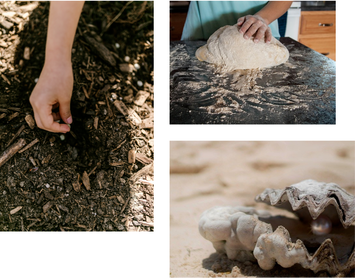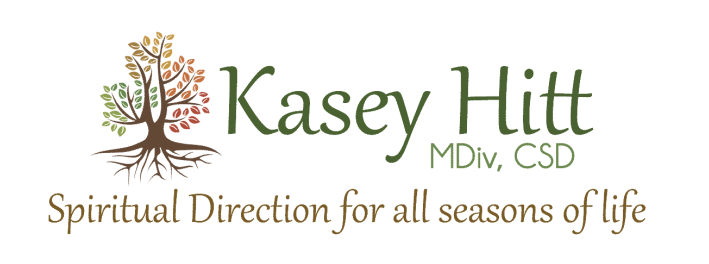 Buy or stream "Call the Midwife" on Amazon/Prime Video Buy or stream "Call the Midwife" on Amazon/Prime Video "Call the Midwife," that's where Wisdom met me after online Centering Prayer recently. The phrase that called to me from Wisdom of Solomon 6:12-20 was "appears to them in their paths," but I had no idea how She was going to appear because I was sick with COVID and able to do little after Centering Prayer but watch Netflix and sleep. All my plans for the week were thwarted. "I don't know how you'll meet me in my path, but I'd love for you to show up somehow," I silently and half-heartedly prayed. So I started watching the last BBC episode of season 12 of "Call the Midwife," and smiled when I saw how plans getting thwarted was the theme! With her big plans thwarted, Trixie, one of the midwives, needed to release her grasp on her ideal and open her hands to all of the Plan Bs being offered by her community. In doing so, she found them to be a better fit for her heart. Says narrator and actress in her eighties Vanessa Redgrave, about the community's efforts on behalf of Trixie as the last scene unfolds in episode 8: "It was makeshift. It was chaotic. It was perfect. It was like Mother Wisdom was speaking right to me (and not just about being sick for a week)! I stopped the show and backed it up numerous times to listen to the voice of one who had born witness to many deaths and births of people and plans. I wrote down her words as an extension to the Wisdom of Solomon, savoring them, allowing them to strengthen my heart and soul.
A week later as the Centering Prayer group continued with Wisdom of Solomon during the time of Lectio Divina following the silence, two phrases from 7:7-14 called to me: "in her hands uncounted wealth" and "unfailing treasure." I couldn't help but think of how Wisdom opens our eyes to a different kind of wealth, a more lasting treasure. Once more, Mother Wisdom's voice, sounding now like Vanessa Redgrave, echoed in my ear, "Here are life's riches next to you..." "Call the Midwife" just may be my new phrase for prayer! Wisdom is certainly showing Herself to be a dependable and delightful Midwife to the Soul! (You can watch "Call the Midwife" on PBS or Netflix and/or join me for online Centering Prayer sometime! )  Photo by Jacqueline Martinez on Unsplash Photo by Jacqueline Martinez on Unsplash There are those poems and prayers that one returns to again and again. This is one of those for me. Patient Trust was written by Pierre Teilhard de Chardin, a Jesuit biologist, philosopher, and paleontologist. Paleontology is the study of ancient life and its changes through the fossil record. Fossils take a long time to form. The processes Chardin observed in nature, he also observed in the soul. Let's not forget that we, too, are part of nature! And the Earth has wisdom to share with us who are often hurried and harried. Patient Trust Above all, trust in the slow work of God. We are quite naturally impatient in everything to reach the end without delay. We should like to skip the intermediate stages. We are impatient of being on the way to something unknown, something new. And yet it is the law of all progress that it is made by passing through some stages of instability-- and that it may take a very long time. And so I think it is with you. your ideas mature gradually—let them grow, let them shape themselves without undue haste. Don’t try to force them on, as though you could be today what time (that is to say, grace and circumstances acting on your own good will) will make of you tomorrow. Only God could say what this new spirit gradually forming within you will be. Give our Lord the benefit of believing that his hand is leading you, and accept the anxiety of feeling yourself in suspense and incomplete. -Pierre Teilhard de Chardin, 1881-1955, French Jesuit, paleontologist, biologist, and philosopher. Found in Hearts on Fire: Praying with Jesuits, p. 102-103. ________________________________
Live with this poem-prayer for an extended amount of time. Notice if you are drawn to the same word or phrase or different ones. What is Patient Trust's impact on you? Do you detect any soul shifts (even if subtle)? Sometimes I begin my sessions of spiritual direction with a poem.
Poetry has a way of guiding us into the Deep with its rhythms, words, pauses, and images. People hear the same poem differently, particular words and phrases catch their attention and "speak" right into the particularities of their lives. The "deep calls to deep" and they respond with an authenticity that surprises them. This very much reflects poet David Whyte's definition of poetry-- "Language against which we have no defenses." The latest poem I have been reading to people who come for Spiritual Direction is one from David Whyte, Just Beyond Yourself. I offer it to you here to read or listen to. Slowly read through it a few times or close your eyes and listen to the recording of me reading it twice. After all, that was the original way of Lectio Divina--hearing the sacred Scriptures being read! As you read or I read to you, listen for the word or phrase that catches your attention. Then allow that word or phrase to speak to your heart. How does it connect with what is going on in your life right now? Listen for the invitations being offered to you through that word or phrase. Let it shape your prayer &/or journaling (even your next conversation in spiritual direction!). JUST BEYOND YOURSELF Just beyond yourself. It’s where you need to be. Half a step into self-forgetting and the rest restored by what you’ll meet. There is a road always beckoning. When you see the two sides of it closing together at that far horizon and deep in the foundations of your own heart at exactly the same time, that’s how you know it’s the road you have to follow. That’s how you know it’s where you have to go. That’s how you know you have to go. That’s how you know. Just beyond yourself, it’s where you need to be. -David Whyte, The Bell and the Blackbird (2018)  What do soil, dough, or oysters have to do with reading a text prayerfully? Meditative or prayerful reading is just one way to read sacred texts like the Bible or the Tao Te Ching. From studying the context within the text itself and the cultural context the text was written in to word studies and devotional reading, you could stay with one passage for a very long time, especially if you add Lectio Divina to the mix! Lectio Divina (Latin for “Divine Reading”) finds its roots in the ancient Jewish practice of meditating on Scripture but was formalized by Saint Benedict of Nursia in the 6th century. It was a cornerstone for spiritual development for the first sixteen centuries of Christian history and has been in the process of recovery since the Reformation left it in the monasteries. And while it has been brought out of the monasteries and even has found its way into apps like Lectio 365, it seems we have to go through a bit of recovery ourselves like letting go of the idea that "more is better"! As we do so, we are ready to enter into the meditative practice of Lectio Divina. By chewing on and resting with a single word or phrase that grabs our attention after slowly reading a short portion 2-3 times, we open to the divine wisdom offered through that word or phrase. We listen to how God is speaking through it and respond to the invitations and insights through prayer and/or journaling. As it takes up residence within us, the wisdom becomes embodied in our inner and outer world. Truly amazing. But after years of facilitating groups that practice Lectio Divina, it can still be difficult. Why? It is hard for us to give up control (even when it comes to prayerfully reading Scripture!). It’s much easier to study a text than allow it to study us! We want it to stay in our heads by looking up the passages before and after the text, by comparing it to other translations, or looking up what words mean in the original languages…all of these are very good practices, but they can be a way to by-pass the heart. Instead, what if we imagine ourselves to be the soil that a single mustard seed is planted in? Or the dough that a woman worked a little yeast throughout? Or the oyster that allowed an irritant to stay within its shell? What do these have in common?
Lectio Divina invites us to become soil, dough, or oysters. Be receptive to the power of a single word or a little phrase (whether it delights or irritates). Spend some time with it, allowing it to spend time with and in your life. In time, you may discover the “pearl of great price” dwells within you! In time, you may become the nourishment (or beauty, medicine, wisdom) the world is waiting for! And all of that through a single word or phrase.  Spiritual practices, like meditation and even church-going, can become spiritual bypass—ways of bypassing reality both outside and inside of us, dissociating from wounds within and without, ignoring the healing work that needs to be done in our inner and outer world. But spiritual practices can also be vehicles for transformation of both ourselves and our world. How?—by giving us new ways of seeing and being (which is the whole point of authentic spiritual practice). Let’s take a look at a few practices... Conscious Breathing: With as little as 10 slow, complete exhales and 10 full, relaxed inhales, we can calm the fight, flight, freeze survival impulse, allowing us to move from a reactive, closed off, defensive place to a receptive, open, deeper place. Centering Prayer: Through daily practice of 20 minutes of silent surrendering to God’s presence & action, we let go of our ego-drivenness and receive inner healing of compulsions and soul wounds. Not only does this bring personal freedom but it releases us from projecting our compulsions and wounds on others and passing them down to our children. Lectio Divina: Spiritual reading allows a word or phrase in a small portion of inspired text, whether sacred Scriptures like the Psalms or a poem, to speak to us. Rather than bringing what we already know or studying it, we allow the text to study us! As we bring our story, our lives, to it, we humbly listen for the wisdom and guidance being offered (which may be encouragement to see a counselor or write a letter to your senator!). Awareness Examen: Looking over our lives at the end of the day through the eyes of God helps us become aware of God’s life-giving presence and action (and the times throughout the day when we were unaware or resistant). The patterns of what is life-giving and life-draining help us discern who we are and what we are to offer this world. Silent Retreats: Extended time in silence and solitude creates space for our souls to rest and play which opens us to better hear the “still, small voice” which may be drowned out by the external noise of daily life or the internal noise of comparing ourselves to others. There are so many practices I could list here but the point isn’t the practice itself, it’s the “fruit.” Seated meditation may not fit you. You may desire some kind of moving meditation, like dance or qigong. Or you may prefer to spend time in nature or doing art. What practices have you found that cultivate love in you? What helps you have eyes to see and tend to the suffering both inside yourself and in others? Which ways of wisdom help you discern what is yours to offer this world (not out of compulsion but compassion)? A Spiritual Director can companion you on this journey of discovery of spiritual practices. But remember, it’s not necessarily the practices, it’s the humans who are transformed by these practices, that this world needs. What do spiritual practices like Centering Prayer offer a hurting world?—YOU!  What do breadsticks have to do with the ancient practice of Lectio Divina? You're about to find out (and I don't think you'll ever forget!). At the recent Middle Tennessee Annual Centering Prayer Gathering, I listened to Father Carl Arico, one of the founding members of Contemplative Outreach, speak about "Centering Prayer as a Way of Life." Those of us who practice Centering Prayer often combine this silent prayer with Lectio Divina, Latin for Divine Reading. In a nutshell, Lectio Divina takes a short portion of Scripture and goes through 4 movements, sometimes referred to as the Four R's:
Father Carl told the story of a youth pastor friend of his who sought to teach his students Lectio Divina in a way that was easy to understand and difficult to forget! So he bought his youth group breadsticks. After passing them out, he told each teen to hold their breadstick in their hand. Then he walked them through the following:
Isn't this a wonderful way to learn to read Scripture? When we read or listen to a portion being read during Lectio Divina, it's like we're taking a bite but not chewing yet. When we move into meditation, we allow a word or phrase to stick out to us and spend time chewing on this bite of Scripture, reflecting on how it intersects with or speaks to our life. Then as we respond by bringing our voice to the Scripture through prayer, we swallow. And just like the ingested breadstick, contemplation invites us to rest in knowing we are being nourished by the word of Scripture through the Spirit of God in ways we have no idea. Now grab a breadstick or Bible and take a bite! Here are some suggested portions of Scripture from the life of Jesus:
|
AuthorKasey is a scarf, ball and club juggling spiritual director just outside of Nashville, TN. Play helps her Type-A, Enneagram 1 personality relax, creating space for poetry and other words to emerge. She also likes playing with theological ideas like perichoresis, and all the ways we're invited into this Triune dance. Archives
January 2024
Categories
All
|
By clicking “Sign up for E-News” I consent to the collection and secure storage of this data as described in the Privacy Policy. The information provided on this form will be used to provide me with updates and marketing. I understand that I may modify or delete my data at any time.


 RSS Feed
RSS Feed

